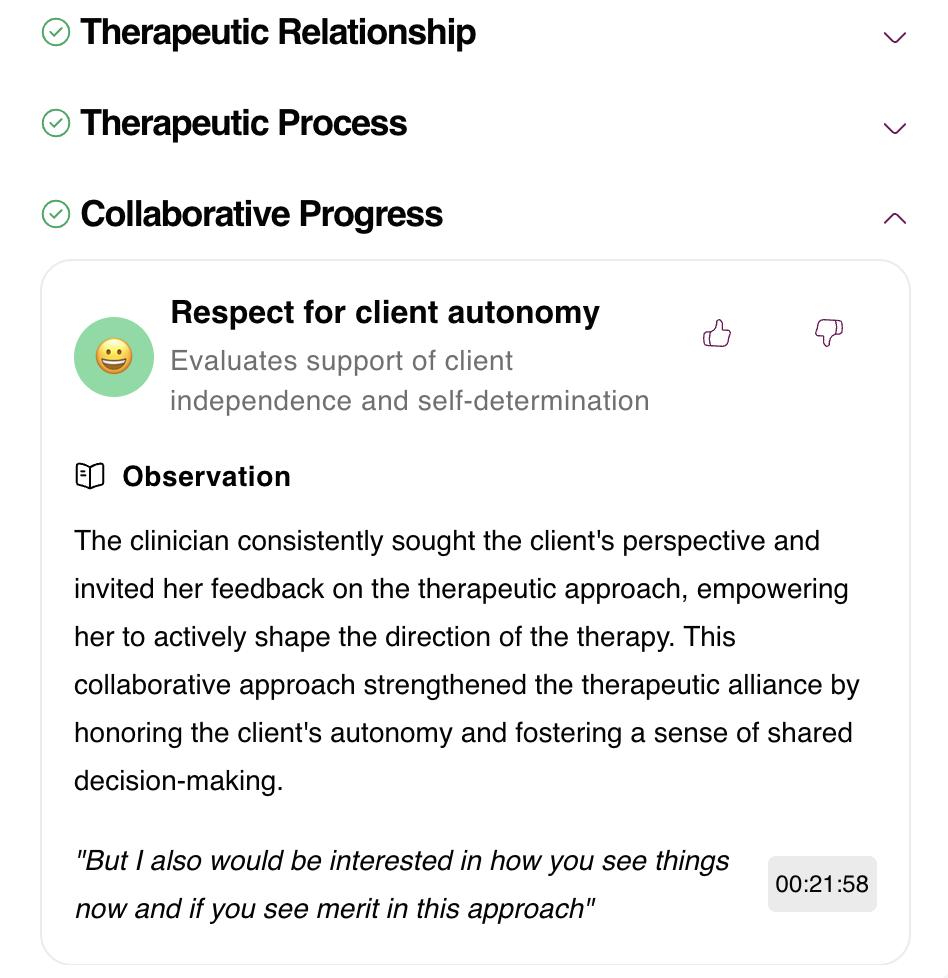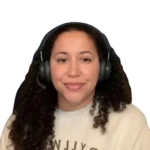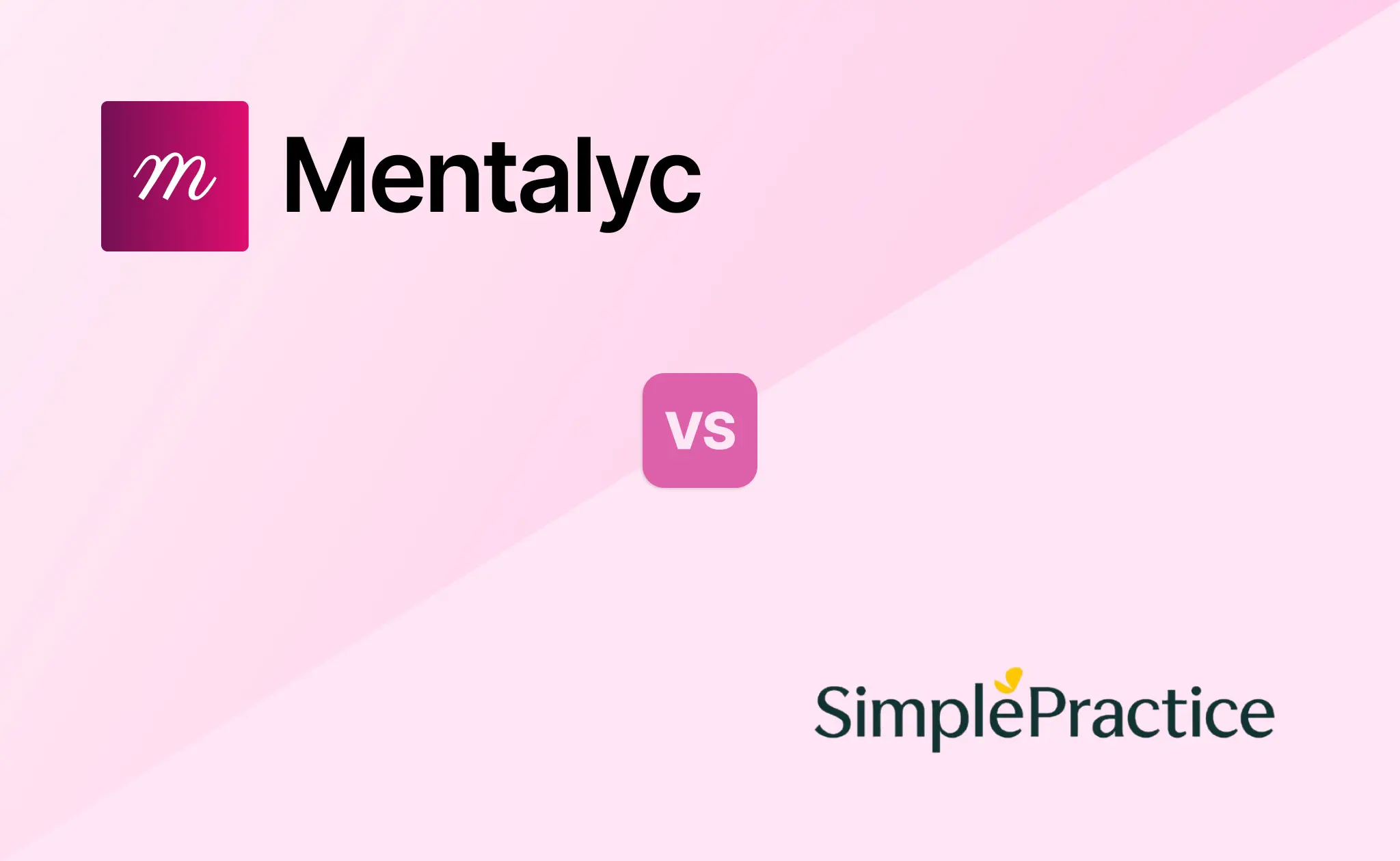Mentalyc vs Note Taker by Simple Practice: Features, Pricing & Detailed Comparison
AI is sneaking into EHRs these days, so we had to take a closer look. We checked out Note Taker, the AI add-on built right into a Simple Practice EHR, and compared it to Mentalyc, a tool made specifically for therapy notes. This “Mentalyc vs Note Taker by Simple Practice” comparison is a matchup that’s gaining attention among clinicians these days.
Here’s the thing – can that Electronic Health Records (EHR) add-on really beat a tool that’s designed specifically for HIPAA-compliant note-taking for therapists? We’re a bit skeptical – and honestly, that doubt feels pretty fair.
With more therapists exploring AI documentation tools, the question naturally comes up: “Should I use Mentalyc or Note Taker?” It’s not just about convenience; it’s about compliance, customization, and quality. Choosing the right tool can have a big impact on how you manage your clinical workflow and protect client data.
Alright, let’s dive into what we found.
Mentalyc vs Note Taker Features Comparison Chart
| Features | Mentalyc | Note Taker by Simple Practice |
| Data Usage Transparency | ✅ | ❌ |
| Full support for All Client Types (individual, group, couple, family, child) | ✅ | ❌ |
| In-person & Telehealth | ✅ | ✅ |
| Dictation | ✅ | ❌ |
| Upload session recordings | ✅ | ❌ |
| Integrates with tools like Zoom | ✅ | ❌ |
| Treatment Plan with SMART goals suggestions | ✅ | ❌ |
| Intake | ✅ | ❌ |
| Progress Tracking | ✅ | ❌ |
| Golden Thread | ✅ | ❌ |
| Various notes formats beyond SOAP | ✅ | ❌ |
| Supervision notes | ✅ | ❌ |
Data Security & Privacy: Mentalyc vs Note Taker for privacy and compliance
APA’s official standards warn that EHR systems can be vulnerable to breaches if proper encryption and access controls aren’t in place—a reminder that not all AI tools meet the same security standards, and choosing the right platform for therapy documentation goes beyond features and into patient protection.
Mentalyc Data Security and Compliance for Therapy Documentation
✅ Mentalyc is built with a strong commitment to client confidentiality, meeting top global privacy standards like HIPAA, SOC2, PHIPA, PIPEDA, GDPR, and the New Zealand Privacy Act.
✅ Every Mentalyc user gets a Business Associate Agreement (BAA), ensuring that all data is managed with rigorous security protocols and full legal compliance. This contributes to secure data handling for therapists, which is vital in today’s compliance-heavy clinical environment.
✅ Mentalyc never sells your data or shares with third-party providers.
✅ Mentalyc is not using your data for training AI models.
✅ All data is fully de-identified.
✅ You can opt out of AI features anytime with the SUPER Plan.
Simple Practice Note Taker Privacy Risks and Third-Party Data Handling
❌ Simple Practice says they never sell PHI (Protected Health Information)- but what about everything else? PHI is a narrow legal term, so that statement might leave out other types of data, like usage or behavioral info, which could still be shared or sold.
❌ Simple Practice states in their Terms that they sometimes partner with other companies to help improve their Add-On AI Products. They say these partners are bound by contracts requiring them to follow the same data restrictions that apply to Simply Practice.
However, involving third parties introduces potential risks:
- Outsourcing data handling – even with contracts (what contracts exactly?) – opens the door to potential exposure or misuse.
- There’s no transparency about who these vendors are or how they manage sensitive data.
- Third parties may not uphold the same security standards, despite what’s promised. That raises serious concerns for clinicians who are trying to decide between Note Taker or Mentalyc for their therapy documentation needs.
- If there’s a breach, it’s providers and their clients who bear the consequences.
❌ Currently, there is no option to opt out of AI training if you decide to use Note Taker.
As data security becomes more critical in mental health tech, clinicians are asking: Is Mentalyc more secure than Note Taker? This question is particularly important when considering the ethical and legal responsibilities of therapy professionals.
For anyone exploring tools in 2025, this “Mentalyc vs Note Taker – full comparison guide” can help clarify the stakes. And ultimately, when it comes to privacy standards, legal compliance, and transparency, it’s worth asking: “Mentalyc or Note Taker by Simple Practice – which is better?”
Notes & Customization: Mentalyc vs Note Taker AI note comparison
Mentalyc Customizable Therapy Note Formats and Clinical Workflows
✅ Mentalyc does way more than just progress notes – it supports your entire clinical workflow, from intake and treatment planning to risk assessments, biopsychosocial evaluations, and safety plans. It’s an all-in-one tool for those asking “Mentalyc or Note Taker – which fits your practice best?”
✅ Whether you’re a solo therapist, part of a team, or supervising others, Mentalyc adapts to your needs and helps you work smoothly with individuals, couples, families, and groups.
✅ It supports multiple note formats like SOAP, DAP, MSE notes, and more, so you can stick with what works best for you.
✅ No matter your therapy style – CBT (Cognitive Behavioral Therapy), DBT, EMDR, Play Therapy, Brainspotting, or others—Mentalyc has you covered. That level of flexibility is a big plus when comparing “Note Taker vs Mentalyc – which one to choose?”
✅ Flexible, customizable templates designed to fit your unique clinical style and workflow perfectly.
✅ Notes of exceptional quality, recognized by therapists—particularly valuable for those seeking automated therapy progress notes that still feel personalized and accurate.
Simple Practice Note Taker
✅ Note Taker can be used for individual, couple, and group appointments.
❌ No support for notes formats beyond SOAP.
❌ No supervision notes.
❌ No full therapy context included. Only reference to the previous session. Relies heavily on the quality and accuracy of your previous notes – if past notes are inconsistent or poor, new note drafts may suffer. This raises the broader question: “Which is better for therapy notes – Mentalyc or Note Taker?”
Mentalyc vs Note Taker Pricing Comparison
| Feature | Mentalyc | Note Taker by Simple Practice |
| Base Pricing Model | Subscription-based, starting at 14.99 / Month | Add-on feature within Simple Practice, part of higher-tier plans |
| Free Trial Available | ✅ Yes (with demo note + limited uploads) | ❌ No separate trial for Note Taker |
| Included Note Formats | SOAP, DAP, MSE, BIRP, EMDR, and more | Only SOAP format supported |
| Add-on or Standalone? | Fully standalone AI tool for therapy documentation | Only accessible within Simple Practice platform |
| Custom Templates & Features | ✅ Included in all plans | ❌ Not available |
| Best Value For | Therapists needing rich documentation & flexible AI workflows | Therapists already using Simple Practice for Telehealth sessions |
Recording & Integration: Note Taker vs Mentalyc – Unbiased Review
Mentalyc Recording, Dictation & Integration Features for Therapists
✅ Whether you’re meeting with clients in person or online, Mentalyc gives you flexible options for documenting your sessions. Some clinicians might want to use the built-in audio recorder, while others stick with familiar platforms such as Zoom. Both approaches are supported, allowing you to work in the way that feels most natural. These are ideal video and audio session capture AI tools, especially helpful for busy clinicians.
✅ If you’ve already recorded a session, you can simply upload the file to the platform. Mentalyc will take it from there, helping streamline your workflow. It’s part of why many consider it a preferred choice when evaluating the best AI therapy software – Note Taker or Mentalyc?
✅ For those who choose not to record, there are still efficient ways to document your session. You can summarize the session afterward by dictating your notes or typing them manually — a real benefit for those seeking clinician-friendly AI tools for everyday use.
✅ Mentalyc also offers more flexibility after the note is created. With the Mentalyc Chrome Extension, clinicians can send their Mentalyc-generated notes into any EHR—including SimplePractice—in one click, without copy-pasting or losing formatting. This gives therapists a smoother workflow no matter which EHR they use.
Simple Practice Note Taker
❌ Note Taker can only be used during a built-in Telehealth when the recording feature is active. This limitation matters when evaluating which is the best AI note-taking tool for therapists – Mentalyc or Note Taker?
❌ You cannot dictate or write notes into Note Taker outside of the session.
❌ You cannot upload transcripts of previous sessions.
Treatment Planning & Analytics: Mentalyc vs Note Taker – Which One handles Data Better?
Mentalyc AI Treatment Planning, SMART Goals & Analytics for Therapists
✅ Treatment plans with tailored SMART goals suggestions, and interventions that fit different therapy styles and client needs. With one click. You can choose from pre-made treatment plans or customize your own by selecting only the sections you need. This is why Mentalyc is often recognized as a leading therapy software with treatment planning capabilities.
✅ Alliance Genie ™ helps therapists get real-time feedback during their sessions without breaking the flow. It’s like having a quiet virtual supervisor in the room, picking up on things you might not notice. After each session, you get a practical insight to help you refine your approach.

✅ Golden Thread – Mentalyc keeps your notes aligned and consistent, so every session builds on the last without losing context. This feature supports high-quality AI-assisted mental health documentation that therapists can rely on.
✅ Progress toward goals – visual dashboards automatically show client growth over time, helping both you and your clients stay motivated and see real results.
✅ Symptoms changes tracking – a feature that helps you gather symptoms-related information and monitor their changes over time. This helps capture valuable information about how clients feel and progress with no questionnaires involved.
Simple Practice Note Taker
❌ Automatic scoring for PHQ-9 and GAD-7 relies on collecting responses from clients. However, not all clients are comfortable or willing to complete assessments.
❌ No advanced analytics available.
Ease of Use: Mentalyc or Note Taker – which one should I use?
Mentalyc User Experience for Therapists Using AI Documentation
✅ Getting started with Mentalyc is a breeze, no matter your tech experience. You won’t have to deal with tricky setups, steep learning curves, or complicated integrations – just log in and jump right in.
✅ To make things even easier, Mentalyc included a demo note that you can use for testing how the system works.
✅ Mentalyc is constantly improving the design to be clear and straightforward, especially for neurodivergent users like those with ADHD and autism — a point often highlighted when comparing Mentalyc vs Note Taker pros and cons in therapist forums.
Simple Practice Note Taker Ease of Use and Limitations
✅ Design looks clean, with a professional look. But for those researching Simple Practice vs Mentalyc for therapists, visual appeal alone may not be enough.
❌ The interface can sometimes feel a bit crowded because there are so many features tucked into the menus, which might feel overwhelming. In fact, this is one of the most common points raised in Mentalyc vs Note Taker user reviews, especially when ease of navigation is critical.
Access to Help: Is Note Taker a good alternative to Mentalyc?
Mentalyc
✅ Find tons of helpful resources like blogs, articles, FAQs, and quick tips right inside the app to guide you whenever you need.
✅ Got a problem? You can easily report it or book a call to talk with a real person – no bots, no waiting, just friendly support whenever you want. This kind of hands-on support can be vital when considering “Mentalyc or Note Taker – which is more compliant with insurance?”, since documentation issues may affect billing.
Simple Practice Note Taker
❌ Looking at reviews on sites like Trustpilot, a lot of users aren’t happy with customer service. They often mention waiting forever for a reply or not being able to talk to a real person, which can be really frustrating.
Note Taker vs Mentalyc – Pros and Cons
| Aspect | Mentalyc | Note Taker by Simple Practice |
| ✅ Pros | – Designed specifically for therapy notes – Multiple note formats (SOAP, DAP, MSE, etc.) – Strong HIPAA compliance with BAA – Works with any EHR – Customizable templates – Tracks client progress visually | – Seamless integration with Simple Practice – Built-in within Telehealth – Auto-generates notes using AI during live sessions |
| ❌ Cons | – Requires uploading or recording sessions – May be an extra tool alongside your EHR | – Limited to SOAP format only – No support for supervision notes – No opt-out for AI – Depends heavily on previous session notes |
| Ideal For | Therapists seeking accurate, flexible, and audit-ready documentation outside their EHR | Existing Simple Practice users wanting basic AI note support inside their platform |
Our Choice: Why Mentalyc is the Best AI Therapy Documentation Software in 2025
AI add-ons are still working their way up before they can really compete with systems built specifically for note-taking. With Simple Practice Note Taker, you get AI-generated notes that cover only SOAP. But Mentalyc? That’s a whole different ballgame. It lets every therapist pick a note format that fits their style, creates notes tailored to their approach, and offers helpful insights to keep therapy moving in the right direction. No wonder so many clinicians are asking: Why choose Mentalyc over Note Taker?
With Mentalyc, you’re not just getting progress notes. You get Treatment Plans, Intake forms, and more, along with tools to track progress and therapeutic alliance – making the invisible parts of therapy more visible. And now, with the Mentalyc Chrome Extension, therapists can bring those high-quality notes into any EHR in a single click, without copy-pasting or losing structure. This gives clinicians the flexibility to keep their preferred EHR while still benefiting from Mentalyc’s richer, more accurate documentation. That kind of therapy software usability for clinicians is what sets Mentalyc apart in day-to-day practice.
So you’re not just going with your intuition – you’ve got clear, solid evidence that shows what’s working and gives you confidence you’re doing your best work for your clients.
If you want documentation that’s audit-proof, truly useful to you, tailored to your style, and fully comprehensive – choose Mentalyc. It’s not just about saving time; it’s an investment in your growth, with supervision-like insights and a clearer view of progress that empowers both you and your clients.
Looking at everything side by side, it’s clear: Note Taker or Mentalyc – which platform wins in 2025? For us, the winner is Mentalyc.
Discover how Mentalyc is giving therapists back their time and peace of mind, straight from their experiences:
Why other mental health professionals love Mentalyc

“A lot of my clients love the functionality where I can send them a summary of what we addressed during the session, and they find it very helpful and enlightening.”
Therapist

“My notes get finished after every single session now because Mentalyc makes it so easy. I’m not stressed out about notes and I feel like my notes are of much higher quality.”
Licensed Clinical Social Worker

“By the end of the day, usually by the end of the session, I have my documentation done. I have a thorough, comprehensive note … It’s just saving me hours every week.”
CDCII

“For anyone hesitant: this is a lifesaver. It will change your life, and you have more time to be present with your patients.”
Licensed Clinical Social Worker







